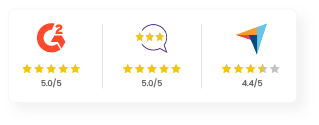LMS vs LXP vs LCMS: Differences and Benefits

If you want your L&D strategy to succeed, you need the right learning platform that gives you the muscle power to deliver. In general, three popular platforms—Learning Management Systems (LMS), Learning Experience Platforms (LXP), and Learning Content Management Systems (LCMS)—often come up in most L&D conversations.
Each has specific benefits and features that cater to different needs. We look at them in detail in this blog.
What is an LMS?
An LMS has been the traditional go-to choice for many organizations thanks to its primary focus on formalized learning processes such as certifications and compliance training. It helps organize, administer and track online training initiatives. In fact, according to Gartner, 41% businesses are looking for an LMS to replace general-purpose tools like email, PowerPoint and YouTube.
An LMS also plays a big role in remote training, tracking progress, and offering a versatile toolkit for corporate training.
Benefits and Features of LMS
Content Management:
An LMS integrates easily with off-the-shelf content libraries and allows users to organize learning materials into different formats, courses, and learning paths. In short, it acts as a centralized repository for diverse e-learning content. Some systems also include native content authoring tools for creating custom course materials.
Enrollment and Progress Tracking:
Administrators can use an LMS to enroll learners, monitor their progress, assess completion rates and generate insightful reports for evaluating individual and group performance.
Social Learning & Gamification:
An LMS supports social learning through forums, group learning environments and learner profiles to enhance communication. Gamification elements like points, badges, and leaderboards increase user engagement.
Assessment Tools:
LMS platforms come equipped with in- built assessment tools so it’s easy to create quizzes, exams, and assignments. This feature helps admins evaluate learners’ comprehension and knowledge retention.
Responsive Design:
An LMS features a responsive design that functions seamlessly across any device so that learners can access learning resources on-the-go.
Certifications:
Ideal for organizations with compliance training needs, LMS offers features for tracking completion, managing re-certification cycles, and ensuring adherence to regulatory standards.
Analysis and Reporting:
Advanced reporting tools provide detailed insights into learner progress, program effectiveness, and areas needing improvement. These analytics help optimize learning outcomes.
What is an LCMS?
An LCMS provides tools to create, manage, and optimize training content. LCMS platforms are mainly meant for content development and to help L&D teams and training managers build and organize course materials efficiently.
Benefits and Features of LCMS
Content Authoring Tools:
LCMS platforms provide advanced tools to create content in various formats, including text, audio, video, and even AR/VR.
Content Management:
Content is stored centrally with metadata tagging for easy retrieval, tracking, and reuse throughout its lifecycle.
Collaborative Authoring:
Given that there could be teams (instead of a single person) creating content, collaboration features in the LCMS enable all members to work together which speeds up the development process.
Integrations:
LCMS platforms integrate with various tools, including LMS, LXP, Customer Relationship Management (CRM), and external authoring tools, in turn, enhancing content creation and management.
What is an LXP?
An LXP is a comparatively newer entrant in the learning market that focuses on a more adaptable and personalized learning journey by tailoring itself to the learner’s choices. Unlike LMS, which is primarily focused on administration, LXP is more clued in to user engagement through curated content, social learning, and AI-driven recommendations.
It enhances learning by offering a Netflix-like experience where users can explore content based on their interests and needs.
Benefits and Features of LXP
Personalized and Adaptive Learning:
Using advanced algorithms, an LXP analyzes learners’ preferences, skills, and objectives. It then delivers personalized content recommendations and adaptive learning paths, customizing the learning experience to each individual.
Content Curation:
An LXP gathers content from diverse sources, including external courses, videos, articles, blogs, podcasts, and social learning platforms. It presents these to learners with a curated library that is relevant and tailored to their individual learning goals.
Social Learning and Collaboration:
With a focus on collaboration, an LXP fosters social learning through features like discussion forums, chat rooms, and the ability to share insights. This creates an interactive environment and promotes engagement.
User-Generated Content:
Encouraging active participation, an LXP empowers learners to create and share their content, promoting knowledge sharing and peer-to-peer learning. Whether through articles, videos, podcasts or presentations, learners contribute to the collective learning experience.
Analytics and Insights:
LXPs offer advanced analytics, providing administrators with in-depth insights into learner engagement, content usage, and overall learning effectiveness. This data empowers organizations to make informed, data-driven decisions for continuous improvement in training programs.
Key Differences Between LMS, LXP & LCMS
Overall Capabilities
An LMS is armed with robust tracking, reporting and management tools that benefit both learners and administrators. LCMS comes with powerful content authoring and collaborative tools while the LXP delivers a personalized, engaging learning experience that encourages user-driven exploration.
Content Strategy
An LMS delivers and manages training programs, tracks learner progress, and also manages certifications. An LCMS, on the other hand, specializes in content creation and management, enabling developing and reusing learning materials efficiently. Meanwhile, an LXP takes the learning experience to the next level with personalized content curation and social learning.
Tracking and Reporting
When it comes to tracking and reporting, the LMS excels with its strong focus on learner progress and compliance. The LCMS, although limited in tracking, emphasizes content usage and management, whereas the LXP provides great insights into content engagement and learner preferences.
User Experience
The LMS is optimized for both learners and administrators, making it easy to manage courses and track performance. The LCMS is specifically designed for content creators with its advanced tools for developing and managing learning materials. The LXP is known for its learner-centric approach, enhancing engagement through an intuitive and personalized user experience.
How to Choose the Right System for Your Organization
This totally depends on your organization’s specific needs!
- If your main goal is delivering and managing training, an LMS is the best choice.
- If your focus is on creating and managing content, LCMS is beneficial.
- If you want a personalized learning experience that empowers users to discover content, consider an LXP.
Conclusion
LMS, LXP, and LCMS each play a unique role in the learning ecosystem. While their functionalities often overlap, they are not necessarily competitors. Instead, they can complement each other!
But platforms like Enthral combine the capabilities of all three and offer an integrated approach! Enthral brings together powerful content creation, personalized learning experiences and advanced management tools which makes it a one-stop solution for modern learning needs.
Check out how Enthral can transform your organization’s training strategy with its all-in-one approach.











